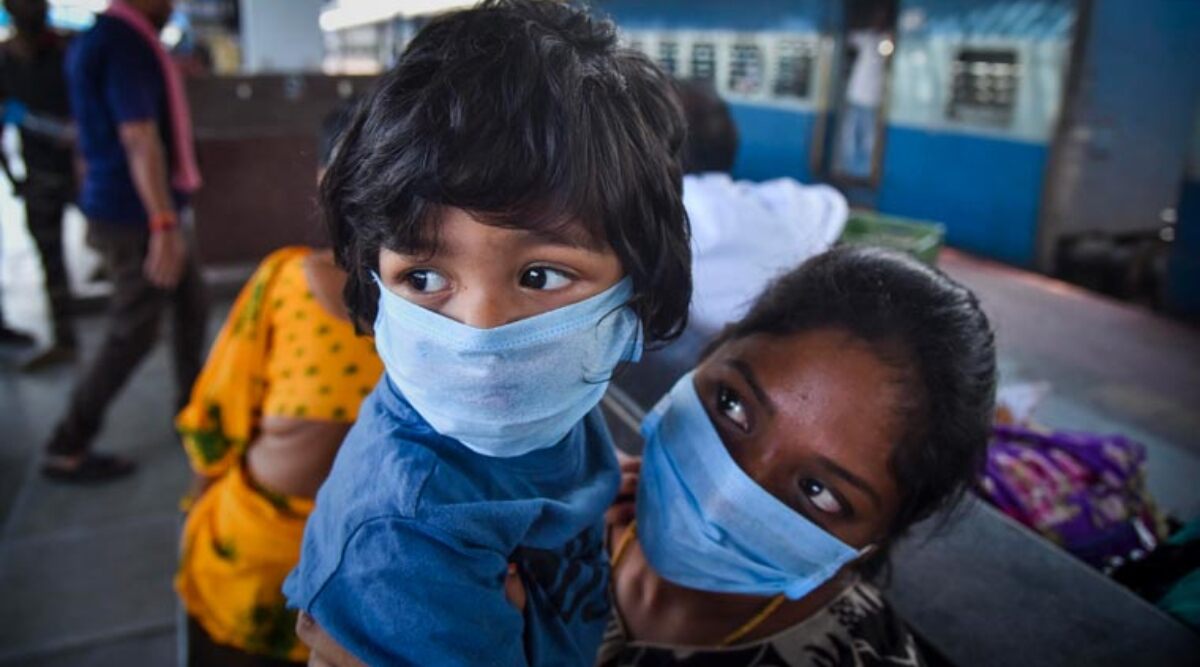
A child wearing a mask to get protected from coronavirus | Image used for representational purpose (Photo Credits: PTI)
New Delhi, May 17: As if it was not enough that novel pandemic COVID-19 was affecting millions of people cutting across the global boundaries, the disease, albeit few in children, is manifesting with symptoms of rare diseases. In a World Health Organisation report, it was found that reports from Europe and North America have described clusters of children and adolescents requiring admission to intensive care units with a multisystem inflammatory condition with some features similar to those of Kawasaki disease and toxic shock syndrome.
The report further said: “Case reports and small series have described a presentation of acute illness accompanied by a hyperinflammatory syndrome, leading to multiorgan failure and shock.13-15 Initial hypotheses are that this syndrome may be related to COVID-19 based on initial laboratory testing. A Children have been treated with anti-inflammatory treatment, including parenteral immunoglobulin and steroids.” First Human Trial of Coronavirus Vaccine Begins at Oxford, Two Volunteers Injected.
Are the Indian kids, suffering from COVID-19, showed some of these symptoms?
Speaking to IANS, a professor from Kalawati Saran Children’s hospital in Delhi said “Yes. There are children who are presenting Kawasaki-like illness and Toxic Shock Syndrome during this pandemic but if their tests happen to be positive for COVID, it is not very clear whether it is due to COVID-19 or if they already had the disease and tested positive.” She said that these symptoms have, However, not been seen in newborns.
“Kids also have mayo cardiac diseases involvement. They do not necessarily show classic flu like illness but fever is there. As far as toxic shock syndrome is concerned, it is a bacterial infection. Therefore it is a very complex medical situation to ascertain whether the child already had the disease or it developed due to COVID-19.”
The WHO report also said, “There is an urgent need for collection of standardized data describing clinical presentations, severity, outcomes, and epidemiology. The WHO has developed a preliminary case definition and case report form for multisystem inflammatory disorder in children and adolescents. The case definition will be revised as more data become available” said the WHO.
According to the preliminary case definition, children and adolescents from 0-19 years of age with fever for more than 3 days and two of the five symptoms: 1. Rash or bilateral non-purulent conjunctivitis or muco-cutaneous inflammation signs (oral, hands or feet), 2. Hypotension or shock, 3. Features of myocardial dysfunction, pericarditis, valvulitis, or coronary abnormalities (including ECHO findings or elevated Troponin/NT-proBNP), 4. Evidence of coagulopathy (by PT, PTT, elevated d-Dimers) and 5. Acute gastrointestinal problems (diarrhoea, vomiting, or abdominal pain) should be identified as suspected or confirmed cases both for the purpose of providing treatment and for provisional reporting and surveillance.
The definition also included elevated markers of inflammation such as ESR, C-reactive protein, or procalcitonin, no other obvious microbial cause of inflammation, including bacterial sepsis, staphylococcal or streptococcal shock syndromes and evidence of COVID-19 (RT-PCR, antigen test or serology positive), or likely contact with patients with COVID-19.
As on May 15, 2020, more than 4 million confirmed cases of COVID-19, including more than 285,000 deaths have been reported to WHO.
According to WHO, among 345 children with laboratory-confirmed COVID-19 and complete information about underlying conditions, 23% had an underlying condition, with chronic lung disease (including asthma), cardiovascular disease, and immunosuppression most commonly reported.
A senior rheumatologist from Delhi’s Sir Gangaram Hospital told IANS that there were no such cases came into her knowledge as yet.
“Kawasaki disease is not a new disease. It is a rare disease most commonly seen in Japan. Most of the European doctors realised that the number of children presenting atypical Kawasaki disease which is rare, increased after COVID-19. Kawasaki disease is a form of vasculitis, where blood vessels become inflamed throughout the body. It can happen due to any viral or bacterial infection. As far as I am concerned I have not come across any such cases where COVID positive kids are presenting these symptoms. In fact one of my patients is suffering at present with this disease but has tested negative for COVID-19. But the medical fraternity must be aware of the dynamic nature of COVID-19 disease as the number of cases are increasing daily.”
Speaking to IANS, another expert DR. Sanjeev Kumar, consultant Pediatrics at Paras hospital who is treating COVID patients, said, “No we did not come across a case with covid 19 with Toxic Shock Syndrome (TSS) or Kawasaki disease but it doesn’t mean that these do not occur. If such symptoms are developed then immediately take expert opinion.
If a Covid-19 patient, associated with Kawasaki or TSS he or she should be treated under supervision of doctor in ICU care. Only 2.4% children are infected with COVID 19 Aunder the age group of 18 years and Aout of them only 2.5% were showing serious symptoms and only 0.2% are very critical. Patients suffering from Kawasaki along with COVID 19 may have fever with swelling in the neck and rashes all over the body and signs of heart failure.”
Lifestyle | Latest Information on Breaking News & Updates on Lifestyle at Latestly.com
